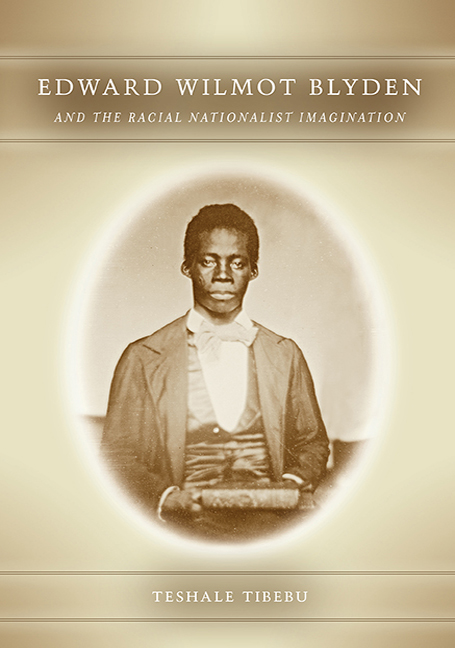Book contents
- Frontmatter
- Dedication
- Contents
- Acknowledgments
- Introduction
- 1 Africa: Service, Suffering, and Subjection
- 2 The Critique of Eurocentrism
- 3 Ishmael in Africa: Black Protestant Islamophilia
- 4 The African American “Civilizing Mission”
- 5 The “Mulatto” Nemesis
- 6 Appraising the Colonial Enterprise
- Epilogue: Post-Blydenian Reflections
- Notes
- Bibliography
- Index
Epilogue: Post-Blydenian Reflections
Published online by Cambridge University Press: 08 April 2017
- Frontmatter
- Dedication
- Contents
- Acknowledgments
- Introduction
- 1 Africa: Service, Suffering, and Subjection
- 2 The Critique of Eurocentrism
- 3 Ishmael in Africa: Black Protestant Islamophilia
- 4 The African American “Civilizing Mission”
- 5 The “Mulatto” Nemesis
- 6 Appraising the Colonial Enterprise
- Epilogue: Post-Blydenian Reflections
- Notes
- Bibliography
- Index
Summary
The Negro African is not finished before he even gets started. Let him speak; above all, let him act. Let him bring, like a leaven, his message to the world in order to help build the Civilization of the Universal.
—Léopold Sédar Senghor, On African SocialismThe Africans who led the struggles for independence against European colonialism in the second half of the twentieth century and who became the first leaders of postcolonial African states were in the main “philosopher kings.” They were politicians who were first-rate intellectuals; they were intellectuals whose vocation was politics. It was not long, however, before the leadership of these philosopher kings was abruptly interrupted by the violent intrusion of the rifle. Kwame Nkrumah, Amilcar Cabral, Julius Nyerere, Jomo Kenyatta, Léopold Sédar Senghor, Augustino Neto, and Nnamdi Azikiwe, among others, were some of those formidable intellectuals. These were men of vision in, for, and by Africa. It was a calamity that such men were removed from their leadership positions by coup d’états, assassinations, or natural death. It is quite telling and chilling to see that Africa has so far been unable to come up with leaders of their stature, wisdom, and foresight. The congruence between state power and the highest level of intellectualism that existed right after the end of colonialism was torn asunder in the subsequent decades. Those with state power were bereft of wisdom; those who possessed wisdom were silenced, killed, or exiled by those in power.
The idea that peoples of Africa and African origin are essentially one people but spread out in many distinctions, directions, and dispositions and that Africa is the home they reside in or venture back from the diaspora to claim as theirs is the fundamental message of the Blydenian paradigm of black racial nationalism. All post-Blydenian black thought rotates around the axis of this matrix. Modern black thought is Blydenian or not, depending on whether it accepts this view of the black experience in the context of the history of the modern world-system.
The tentacles of Blyden's paradigm are spread out in all directions, intellectually as well as politically. The various shades of pan-Africanism, including those as diverse as W. E. B. Du Bois and Marcus Garvey, contain Blydenian projects: the unity and “uplifting” of the African race.
- Type
- Chapter
- Information
- Edward Wilmot Blyden and the Racial Nationalist Imagination , pp. 146 - 172Publisher: Boydell & BrewerPrint publication year: 2012

